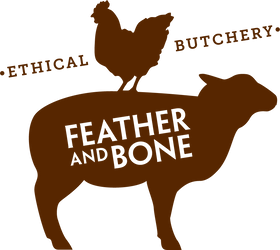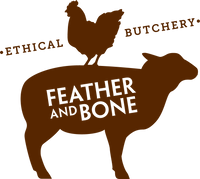The mystery of the anonymous farmer
We've been working in the area of sustainable livestock production for a very short time, a mere eight years or so. In the scheme of things and compared to many wise men and women out there, we're a blip on the radar and we're very aware of the shallow depths of our knowledge.
This can be disheartening, but there's also something perversely exciting about the fact that the more you know, the more you realise how little you know which means that there are years and years of wonderful things still to discover and plenty of opportunities to become less of a drongo and possibly even, one day, become one of the Wise Men and Women.
The point is that we're not claiming to be experts. But we've been around this industry long enough now to be very confident of one thing.
There isn't a single farmer engaged in genuine free range livestock production on this wide brown land or in the seas by which it is girt that isn't proud of their work and who wouldn't want their name or brand on the label of their product.
For these producers, whose holy grail is the achievement of a perfectly balanced, harmonious orchestra of soil, plants and animals in the patch over which they have custodianship, the name of their farm is shorthand for their entire approach to life. Because farming for the long term, without the habitual use of chemical fertilisers, pesticides, hormones, antibiotics and other artificial inputs, requires a level of acute observation, responsiveness and agility that many farmers either aren't prepared to give or feel would compromise their short term productivity too seriously to be viable.
We've observed the work that goes into building sustainable fertility that depends for it's productivity on complex, well-structured soil and observed over multiple visits how many years this process can take. We've seen how necessary soil health and water retention is for the health and welfare of plants and pastured animals. We've observed how challenging - and rewarding - it is to raise truly free ranging animals that live outside on pasture, negotiating the full spectrum of the seasons. We've observed and experienced first hand (oh yes) how unpredictable and demanding it can be to source and market these products.
We also know that, while the number of farmers choosing to move away from intensive plant and animal production is increasing, farmers practicing genuine sustainable production are still very much in a minority. Consumers who've decided they want to buy truly sustainably-produced produce, from genuine free range animals, are still choosing from a fairly small group of farmers and products. Until the ACCC promulgates its enforceable free-range standards for chickens and pigs, which will hopefully dramatically reduce the incidences of fraud, there remain many questionable claims by retailers and restaurants about just how freely their birds and pigs did roam.
All the more reason for proud, free range farmers who welcome scrutiny and love to show you their farms to be very motivated to see their name on their product and differentiate themselves from those who say but don't do.
So why don't they?
How is it that there are so many thousands of anonymous Free Range chickens out there that don't have the name of the farmer emblazoned proudly across them? Why would a providore like us, or a retailer, or a chef choose not to make themselves look good by trumpeting the name of a genuine farmer of high quality, sustainably-farmed produce? Particularly when anything made from truly sustainably-raised produce is expensive so the customer needs to be given every reason to feel good about the purchase.
There are only two answers to this mystery.
Either the chicken isn't what it's claimed to be which is why there's no mention of the farm, or the farmer who produced the chicken isn't proud enough to put their name to the product. Which leads us to the second mystery.
THE MYSTERY OF THE UNQUESTIONING SHOPPER
Why do consumers accept a claim such as 'Free Range', which defines the fundamental characteristics of the food they are going to feed themselves and their loved ones, so blindly without any proof whatsoever? The obvious answer is the degree to which so many of us have become disconnected from the agricultural production process - most of us don't know anything about farming at all - and the fact that we're all so frantically busy that no one has time to stop and question.
But there's got to be something else going on here. Why do consumers apply more rigour and scrutiny to the provenance and quality of a dishwasher than they do to the animal they're about to consume?
We walked into a shop the other day and picked up a whole chook labeled with the name of the retailer and the words 'Free Range Whole Chicken'. Nothing else except the weight and the price - $10.50 per kilo, which is very low for a real free range chicken. No provenance and no free range certification. We asked the shop assistant which farm the chook came from and she was very puzzled by the question. Clearly, most shoppers don't ask. After some investigation she was able to tell us the region the chicken came from but that's all.
Free range chicken pricing is interesting.
A true pasture-raised or Humane Choice Free Range certified chicken with transparent provenance to a specific farm such as Buena Vista or Burrawong retails for between $15.00 - $19.00 per kg.
A Barossa Farm Produce chook, described as free range but without certification, sourced from a number of South Australian farms none of which are specified, retails for $19.95 per kg.
FREPA certified whole chickens with unspecified provenance, such as those sold under the Lilydale brand, usually retail for $6.00 - $9.00 per kg. FREPA certification allows much higher stocking densities - 56 cm sq per bird if the sheds are mechanically ventilated - than HC Free Range or fully pastured poultry. Companies such as Lilydale which source from many, high volume farms can afford to sell their chickens at a very competitive price.
There are several other chicken brands you might see on restaurant menus or in reputable butchers which don't claim to be free range or provide information about the farms from which the chickens are sourced but which are often described by retailers or restaurants as Free Range. These chickens are intensively raised in sheds but given a slightly richer, corn-heavy diet which means they cost more to produce and are more expensive to buy.





Leave a comment